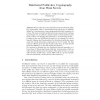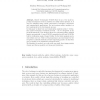637 search results - page 117 / 128 » The Case for Abstracting Security Policies |
120
click to vote
VEE
2009
ACM
15 years 8 months ago
2009
ACM
r of high-level languages lies in their abstraction over hardware and software complexity, leading to greater security, better reliability, and lower development costs. However, o...
129
click to vote
PKC
2009
Springer
16 years 2 months ago
2009
Springer
Abstract.We introduce the notion of distributed password-based publickey cryptography, where a virtual high-entropy private key is implicitly dened as a concatenation of low-entrop...
110
click to vote
ESOP
2010
Springer
15 years 11 months ago
2010
Springer
Transient faults are single-shot hardware errors caused by high energy particles from space, manufacturing defects, overheating, and other sources. Such faults can be devastating f...
109
click to vote
ASIAN
2007
Springer
15 years 8 months ago
2007
Springer
Abstract. This paper is concerned about relating formal and computational models of cryptography in case of active adversaries when formal security analysis is done with first ord...
110
click to vote
SAFECOMP
2007
Springer
15 years 7 months ago
2007
Springer
Abstract. Esterel Technologies’ SCADE Suite is one of the most important development tools for software for safety-critical systems. It is used for designing many critical compon...


